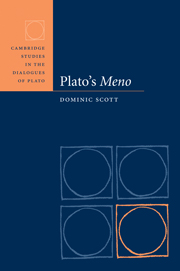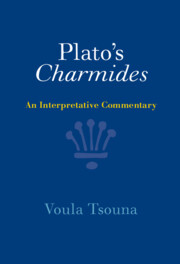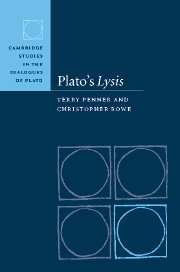Plato's Meno
Given its brevity, Plato's Meno covers an astonishingly wide array of topics: politics, education, virtue, definition, philosophical method, mathematics, the nature and acquisition of knowledge and immortality. Its treatment of these, though profound, is tantalisingly short, leaving the reader with many unresolved questions. This book confronts the dialogue's many enigmas and attempts to solve them in a way that is both lucid and sympathetic to Plato's philosophy. Reading the dialogue as a whole, it explains how different arguments are related to one another and how the interplay between characters is connected to the philosophical content of the work. In a new departure, this book's exploration focuses primarily on the content and coherence of the dialogue in its own right and not merely in the context of other dialogues, making it required reading for all students of Plato, be they from the world of classics or philosophy.
Reviews & endorsements
"Dominic Scott's contribution to the McCabe series of commentaries on Platonic dialogues is a most welcome addition to that still short but fine list. Scott's clear analysis and considered judgments illuminate previously dark corners of the dialogue. The great value of Scott's book lies in the stimulating questions it raises and in the often novel and always carefully supported ideas it advances. it should not be missed by anyone interested in Plato's Meno."
Roslyn Weiss, Lehigh University, Bryn Mawr Classical Review
"Scott's interpretation of the Meno has raised challenging questions and offers fresh answers that are supported by a close reading of the dialogue...It makes a serious contribution to the study of Plato and should not be neglected." --Lee Trepanier, Saginaw Valley State University: The Review of Metaphysics
Product details
March 2009Paperback
9780521104685
252 pages
229 × 152 × 15 mm
0.38kg
Available
Table of Contents
- Introduction
- Part I:
- 1. The opening:
- 70a–71d
- 2. The first definition:
- 71e–73c
- 3. A lesson in definition:
- 73c–77d
- 4. The third definition:
- 77b–79e
- 5. Meno as interlocutor
- Part II:
- 6. The stingray:
- 79e–80d
- 7. 'Meno's paradox':
- 80d–81a
- 8. The emergence of recollection:
- 81a–e
- 9. The argument for recollection:
- 82b–85d
- 10. The conclusion:
- 86b6–c2
- Part III:
- 11. The method of hyposthesis:
- 86c–87c
- 12. Virtue is teachable:
- 87c–89c
- 13. Virtue is not teachable:
- 89e–96d
- 14. Virtue as true belief:
- 96d–100b
- 15. Irony in the Meno: the evidence of the Gorgias
- 16. Meno's progress
- Conclusion
- Appendices
- References
- Indexes.





